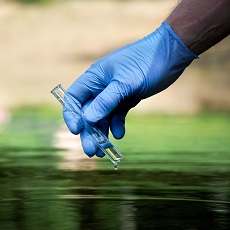
Cholera is a bacterial infection that causes diarrhea. The cholera bacterium is usually found in water or food that has been contaminated by feces (poop). Cholera is rare in the US. You may get it if you travel to parts of the world with poor water and sewage treatment. Outbreaks can also happen after disasters. The disease is not likely to spread directly from person to person.
Cholera infections are often mild. Some people don't have any symptoms. If you do get symptoms, they usually start 2 to 3 days after infection. The most common symptom is watery diarrhea.
- Cholera (National Library of Medicine)Cholera is a bacterial infection that causes diarrhea. The cholera bacterium is usually found in water or food that has been contaminated by feces (poop). Cholera is rare in the US. You may get ...
- Cholera is a bacterial infection of the small intestine that causes a large amount of watery diarrhea. ... Cholera is caused by the bacteria Vibrio cholerae . These bacteria release a toxin that causes an increased ...
- Cholera in Children (American Academy of Pediatrics)Cholera/Learn More ... Cholera ... American Academy of Pediatrics ... Cholera, Vibrio, diarrhea, shellfish food poisoning, cholera vaccine, V cholerae bacteria, Latin ...
- Cholera Fact Sheet (World Health Organization)WHO fact sheet on cholera: includes cholera key facts, definition, symptoms, history, risk factors, prevention, control, treatment, travel and WHO response
- Cholera Treatment (Centers for Disease Control and Prevention)Cholera patients should be evaluated and treated quickly with Rehydration therapy, Antibiotic treatment, and Zinc treatment. ... Cholera, Vibrio, Vibrio cholerae, O1, O139, O-group, non-O1, non-O139, toxigenic, symptoms, Outbreak, Watery Diarrhea, ...
- Why get vaccinated?Cholera is a disease that can cause severe diarrhea and vomiting. If it isn't treated quickly, it can lead ... 130,000 people are thought to die from cholera each year, almost all of them in countries ...
- Cholera Illness and Symptoms (Centers for Disease Control and Prevention)Cholera is an acute, diarrheal illness caused by infection of the intestine with the bacterium Vibrio cholerae ... Cholera, Vibrio, Vibrio cholerae, O1, O139, O-group, non-O1, non-O139, toxigenic, symptoms, Outbreak, Watery Diarrhea, ...
- Cholera Prevention and Control (Centers for Disease Control and Prevention)Prevention of cholera is dependent on access to safe water, adequate sanitation, and basic hygiene needs. ... Cholera, Vibrio, Vibrio cholerae, O1, O139, O-group, non-O1, non-O139, toxigenic, symptoms, Outbreak, Watery Diarrhea, ...
- Cholera/Clinical Trials ... Cholera
- Travelers' Health: Immunocompromised Travelers (Centers for Disease Control and Prevention)Immune System and Disorders/Related Issues ... Immune System and Disorders ... Traveler's Health/Related Issues ... Traveler's Health ... Centers for Disease Control and ...



